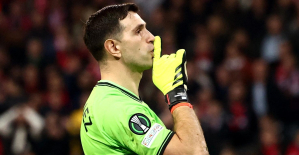Germany and France are jointly speaking out against a far-reaching entry ban for Russian citizens in the EU. "We should think about clever ways to use the important lever of issuing visas," says a position paper sent to the other member states for the meeting of foreign ministers this Tuesday and Wednesday in Prague. Applications from Russian nationals should be carefully scrutinized for possible security risks. At the same time, one should not underestimate the impact of direct experience of life in democracies. This applies in particular to future generations.
"Our visa policy should reflect this and continue to enable interpersonal contacts with Russian nationals in the EU who are not connected to the Russian government," says the paper, which is available to the German Press Agency. They therefore want to maintain a legal framework that allows students, artists, scientists and specialists in particular to enter the EU - regardless of whether they could be threatened with political persecution.
One warns against far-reaching restrictions of the visa policy. It is important to prevent the Russian narrative from being fed and from alienating future generations. In addition, so-called "rally around the flag" effects could occur. This means that citizens sometimes tend to stand united behind their leadership in the event of attacks and provocations from outside.
The background to the German-French position is the discussion that has been going on for days about whether Russians should be prevented from traveling to the EU for shopping trips and vacations, while thousands of people are dying in Ukraine because of the war.
Before the meeting of EU foreign ministers in Prague, Austria reiterated its opposition to entry bans for Russian tourists. "We must not throw out the baby with the bath water, a blanket ban on visas for Russian nationals would completely cut off the last contacts with Russian civil society," Austrian Foreign Minister Alexander Schallenberg told the "Welt" on Tuesday. "It would be absurd to block the way to the West for critical voices in Russia right now."
The Kremlin's news embargo is obscuring the Russian population's view of the actions of Russian President Vladimir Putin in Ukraine, the minister said. “A visa freeze would also be counterproductive in the fight against the Russian propaganda machine. If we block the door to Europe for the Russian population across the board, that would only fuel the camp mentality propagated by the Kremlin.”
According to a US media report, Iran has sent the first drones to Russia for use in Ukraine. As the Washington Post reported on Monday, citing intelligence sources, at least two different types of unmanned aircraft were delivered on August 19.
These could be used to fire on radar systems, artillery and other military objects. However, the Russian armed forces had to contend with numerous malfunctions during the first tests. The Russians are "not satisfied". According to the report, the US government expects Iran to deliver hundreds more drones to Moscow.
The United States said in July that they assumed Russia would want to acquire Iranian combat drones. A Russian government delegation apparently visited an Iranian airport for a demonstration of attackable drones, it said. Putin also traveled to Iran's capital, Tehran, for a summit meeting with his Iranian and Turkish counterparts in July.

 Sydney: Assyrian bishop stabbed, conservative TikToker outspoken on Islam
Sydney: Assyrian bishop stabbed, conservative TikToker outspoken on Islam Torrential rains in Dubai: “The event is so intense that we cannot find analogues in our databases”
Torrential rains in Dubai: “The event is so intense that we cannot find analogues in our databases” Rishi Sunak wants a tobacco-free UK
Rishi Sunak wants a tobacco-free UK In Africa, the number of millionaires will boom over the next ten years
In Africa, the number of millionaires will boom over the next ten years WHO concerned about spread of H5N1 avian flu to new species, including humans
WHO concerned about spread of H5N1 avian flu to new species, including humans New generation mosquito nets prove much more effective against malaria
New generation mosquito nets prove much more effective against malaria Covid-19: everything you need to know about the new vaccination campaign which is starting
Covid-19: everything you need to know about the new vaccination campaign which is starting The best laptops of the moment boast artificial intelligence
The best laptops of the moment boast artificial intelligence Bitcoin halving: what will the planned reduction in emissions from the queen of cryptos change?
Bitcoin halving: what will the planned reduction in emissions from the queen of cryptos change? The Flink home shopping delivery platform will be liquidated in France
The Flink home shopping delivery platform will be liquidated in France Bercy threatens to veto the sale of Biogaran (Servier) to an Indian industrialist
Bercy threatens to veto the sale of Biogaran (Servier) to an Indian industrialist Switch or signaling breakdown, operating incident or catenaries... Do you speak the language of RATP and SNCF?
Switch or signaling breakdown, operating incident or catenaries... Do you speak the language of RATP and SNCF? The main facade of the old Copenhagen Stock Exchange collapsed, two days after the fire started
The main facade of the old Copenhagen Stock Exchange collapsed, two days after the fire started Alain Delon decorated by Ukraine for his support in the conflict against Russia
Alain Delon decorated by Ukraine for his support in the conflict against Russia Who’s Who launches the first edition of its literary prize
Who’s Who launches the first edition of its literary prize Sylvain Amic appointed to the Musée d’Orsay to replace Christophe Leribault
Sylvain Amic appointed to the Musée d’Orsay to replace Christophe Leribault Skoda Kodiaq 2024: a 'beast' plug-in hybrid SUV
Skoda Kodiaq 2024: a 'beast' plug-in hybrid SUV Tesla launches a new Model Y with 600 km of autonomy at a "more accessible price"
Tesla launches a new Model Y with 600 km of autonomy at a "more accessible price" The 10 best-selling cars in March 2024 in Spain: sales fall due to Easter
The 10 best-selling cars in March 2024 in Spain: sales fall due to Easter A private jet company buys more than 100 flying cars
A private jet company buys more than 100 flying cars This is how housing prices have changed in Spain in the last decade
This is how housing prices have changed in Spain in the last decade The home mortgage firm drops 10% in January and interest soars to 3.46%
The home mortgage firm drops 10% in January and interest soars to 3.46% The jewel of the Rocío de Nagüeles urbanization: a dream villa in Marbella
The jewel of the Rocío de Nagüeles urbanization: a dream villa in Marbella Rental prices grow by 7.3% in February: where does it go up and where does it go down?
Rental prices grow by 7.3% in February: where does it go up and where does it go down? With the promise of a “real burst of authority”, Gabriel Attal provokes the ire of the opposition
With the promise of a “real burst of authority”, Gabriel Attal provokes the ire of the opposition Europeans: the schedule of debates to follow between now and June 9
Europeans: the schedule of debates to follow between now and June 9 Europeans: “In France, there is a left and there is a right,” assures Bellamy
Europeans: “In France, there is a left and there is a right,” assures Bellamy During the night of the economy, the right points out the budgetary flaws of the macronie
During the night of the economy, the right points out the budgetary flaws of the macronie These French cities that will boycott the World Cup in Qatar
These French cities that will boycott the World Cup in Qatar Europa Conference League: the semi-final flies to Lille, which loses to the wire against Aston Villa
Europa Conference League: the semi-final flies to Lille, which loses to the wire against Aston Villa Lille-Aston Villa: Cash disgusts Lille, the arbitration too... The tops and the flops
Lille-Aston Villa: Cash disgusts Lille, the arbitration too... The tops and the flops Handball: Les Bleues in the same group as Spain at Euro 2024
Handball: Les Bleues in the same group as Spain at Euro 2024 Europa Conference League: for Létang, Martinez “does not have the attitude of a high-level athlete”
Europa Conference League: for Létang, Martinez “does not have the attitude of a high-level athlete”


















